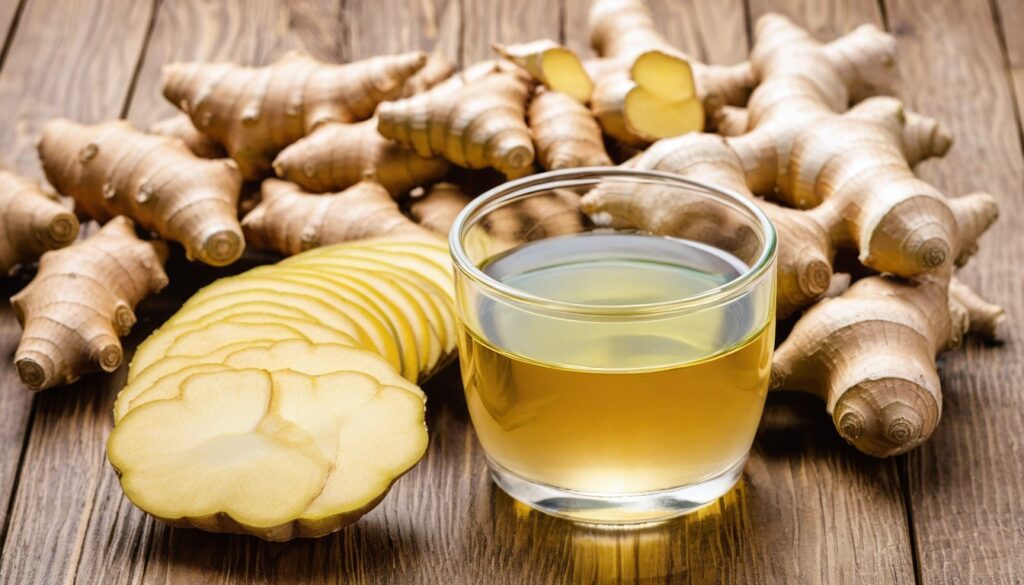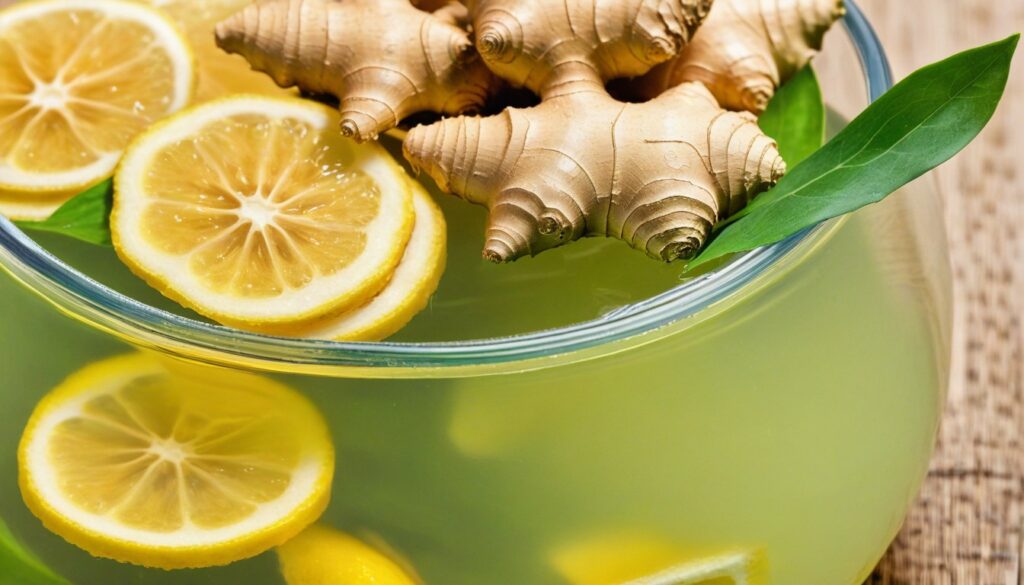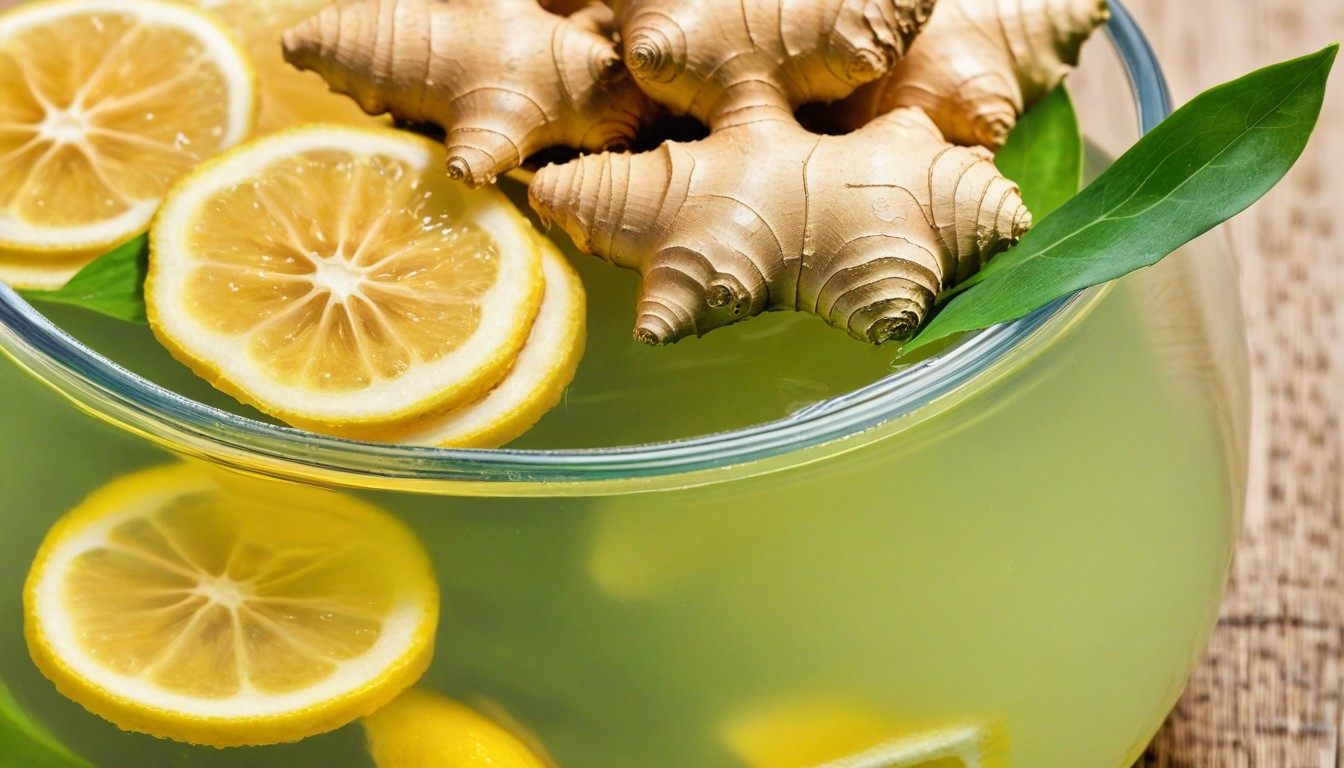Welcome to a comprehensive journey into the world of fitness optimization through a simple yet powerful ingredient: ginger. In this article, we’ll uncover the untapped potential of ginger and how it can revolutionize your fitness routine. Get ready to discover the nutritional wonders that ginger offers, enhancing your exercise performance and overall well-being.
Throughout this guide, we’ll delve into the science-backed benefits of ginger, exploring its ability to boost endurance, aid recovery, and elevate your fitness journey to new heights. Prepare to unlock the secrets that ginger holds for maximizing your fitness potential.
And as a bonus, at the end of this article, we’ve curated a 7-day meal plan enriched with ginger-infused recipes. These delectable suggestions are tailored to complement your fitness routine, ensuring a delicious and nutritious path toward achieving your health and wellness goals. Stay tuned for these exclusive meal ideas to supercharge your fitness journey!

Introduction
Nutrition serves as the cornerstone of our fitness endeavors, intricately woven into the fabric of our physical well-being. As a seasoned nutritionist passionate about unveiling the most potent tools for optimizing fitness, I’ve witnessed firsthand the transformative power of strategic nourishment.
In the realm of fitness, every stride, lift, or stretch is intricately linked to the fuel we provide our bodies. Beyond mere sustenance, nutrition becomes the catalyst for performance enhancement, recovery, and endurance. It’s within this landscape that ginger emerges as a hidden gem, ready to revolutionize your fitness journey.
Ginger, often revered for its culinary essence, holds far more than just flavor. Its potential impact on fitness performance transcends its humble appearance. As we delve deeper into this exploration, brace yourself for a revelation—a glimpse into the profound influence ginger can wield over your exercise endeavors.
The journey we embark upon here is not just about adding another ingredient to your pantry; it’s about unlocking a reservoir of possibilities to fortify your fitness regimen. Join me in uncovering the layers of scientific evidence that underscore ginger’s prowess in elevating not just our workouts, but our overall well-being.

Understanding Ginger’s Nutritional Composition
Ginger, a knobby root renowned for its zesty flavor, harbors a wealth of nutritional components that contribute significantly to its multifaceted benefits in enhancing exercise performance.
1. Vitamins and Minerals:
- Vitamins: Ginger boasts a spectrum of essential vitamins, including vitamin C, B-vitamins like niacin and riboflavin, and vital minerals such as potassium, manganese, and magnesium.
- Benefits: These nutrients act as cofactors in various enzymatic reactions, aiding energy metabolism, muscle function, and cellular repair—critical aspects underpinning exercise-induced stress and recovery.
2. Antioxidants:
- Gingerol and Shogaol: The primary bioactive compounds in ginger, known for their potent antioxidant properties.
- Benefits: These antioxidants combat oxidative stress induced by intense workouts, safeguarding cells from damage, and mitigating exercise-induced inflammation, thereby expediting recovery.
How These Components Benefit the Body during Exercise:
- Enhanced Nutrient Absorption: Ginger’s bioactive compounds facilitate improved nutrient absorption, especially crucial during exercise when the body requires efficient uptake of nutrients for energy production and muscle repair.
- Reduced Inflammation: The anti-inflammatory properties of ginger components aid in minimizing exercise-induced muscle soreness, promoting faster recovery between workouts.
- Sustained Energy Levels: The combination of vitamins and minerals in ginger supports sustained energy levels during exercise, contributing to enhanced endurance and performance.
How Ginger Enhances Fitness Performance
1. Improving Digestion and Nutrient Absorption:
- Gastrointestinal Benefits: Ginger aids digestion by stimulating the production of digestive enzymes and bile, facilitating smoother nutrient breakdown and absorption.
- Impact during Exercise: Enhanced digestion ensures efficient utilization of nutrients consumed before and during workouts, providing a more readily available energy source to fuel performance.
2. Anti-Inflammatory Properties and Impact on Recovery:
- Reducing Exercise-Induced Inflammation: The potent anti-inflammatory compounds in ginger, particularly gingerol and shogaol, work to alleviate inflammation in muscles and joints post-exercise.
- Facilitating Quicker Recovery: By mitigating exercise-induced inflammation, ginger expedites the recovery process, enabling individuals to bounce back faster, leading to more consistent and productive workout sessions.
3. Boosting Metabolism and Energy Levels:
- Metabolic Stimulation: Ginger has been linked to a slight increase in metabolic rate, attributed to its thermogenic properties, potentially aiding in fat oxidation.
- Impact on Energy: By promoting better nutrient absorption and circulation, ginger contributes to sustained energy levels, crucial for maintaining endurance and optimizing workout performance.
Synergistic Impact: When combined, these attributes of ginger—improved digestion, reduced inflammation, and metabolic support—create an environment conducive to heightened fitness performance. They not only augment physical capabilities during exercise but also expedite recovery, allowing individuals to push their limits consistently.

Ginger’s Impact on Endurance and Stamina
1. Improving Endurance:
- Research Insights: Studies suggest that ginger’s bioactive compounds, particularly gingerol, exhibit potential in enhancing endurance by improving oxygen utilization and reducing fatigue markers.
- Enhanced Oxygen Utilization: Ginger may aid in optimizing oxygen uptake by the body during exercise, potentially prolonging endurance levels.
- Delayed Fatigue: The anti-fatigue properties of ginger contribute to delayed exhaustion during workouts, allowing individuals to sustain exercise for longer durations.
2. Effects on Stamina and Prolonged Exercise Sessions:
- Stamina Enhancement: Ginger’s influence on blood circulation and oxygen delivery to muscles contributes to improved stamina, enabling individuals to endure more rigorous workouts.
- Mitigating Exercise-Induced Stress: By reducing oxidative stress and inflammation, ginger assists in preserving stamina, thereby supporting prolonged exercise sessions with reduced physical strain.
Scientific Support: While further research is ongoing to comprehensively establish ginger’s exact mechanisms in enhancing endurance and stamina, preliminary findings showcase promising evidence of its potential to positively impact exercise performance.
Practical Application: Integrating ginger into pre-workout routines or consuming it as part of a balanced diet may offer subtle yet noticeable improvements in endurance and stamina, providing individuals with the edge to push their exercise limits further.
Managing Exercise-Related Issues with Ginger
1. Addressing Nausea:
- Anti-Nausea Properties: Ginger has long been recognized for its ability to alleviate nausea, making it a valuable aid for individuals experiencing exercise-induced queasiness.
- Application: Consuming ginger in various forms (infusions, capsules, or fresh ginger) before exercise can help preemptively manage nausea during intense workouts.
2. Easing Muscle Soreness:
- Anti-Inflammatory Effects: Ginger’s anti-inflammatory compounds can help reduce muscle soreness post-exercise.
- Usage Tip: Consuming ginger post-workout, either through supplements or ginger-infused beverages, may aid in alleviating muscle discomfort.
3. Mitigating Inflammation:
- Reducing Exercise-Induced Inflammation: Ginger’s potent anti-inflammatory properties can assist in minimizing the inflammatory response triggered by intense workouts.
- Incorporation Strategies: Incorporating ginger into pre, during, and post-exercise routines through teas, smoothies, or as a seasoning in meals can help manage inflammation levels.
Incorporation into Exercise Routines:
- Pre-Exercise: Consuming ginger-infused beverages or snacks before workouts can preemptively address nausea and support digestion.
- During Exercise: For prolonged sessions, carrying ginger-based snacks or drinks can aid in managing fatigue and nausea.
- Post-Exercise: Incorporating ginger into recovery meals or beverages may assist in reducing muscle soreness and inflammation, facilitating quicker recovery.
Practical Approach: Experimenting with different ginger-infused recipes, beverages, or supplements allows individuals to tailor ginger intake to their exercise routines, effectively managing common exercise-related issues.

Ginger Recipes for Exercise Hydration:
1. Ginger Lemonade:
- Recipe: Mix freshly grated ginger, lemon juice, honey, and water. Serve over ice.
- Nutritional Benefits: Ginger aids digestion, while lemon provides vitamin C and antioxidants, offering a refreshing, hydrating option for low-intensity workouts.
2. Ginger Mint Green Tea:
- Recipe: Brew green tea with ginger slices and fresh mint leaves. Chill and serve.
- Nutritional Benefits: Green tea delivers antioxidants, while ginger and mint aid digestion and offer a light caffeine boost, suitable for moderate workouts.
3. Pineapple Ginger Smoothie:
- Recipe: Blend pineapple chunks, grated ginger, Greek yogurt, and coconut water.
- Nutritional Benefits: Rich in potassium from pineapple and electrolytes from coconut water, this smoothie aids hydration during intense workouts.
4. Cucumber Ginger Infused Water:
- Recipe: Combine cucumber slices, ginger, and mint in water. Infuse overnight in the fridge.
- Nutritional Benefits: Hydrating and refreshing, cucumber provides additional hydration, while ginger aids digestion, perfect for post-workout recovery.
5. Ginger Berry Electrolyte Drink:
- Recipe: Blend mixed berries, ginger, coconut water, and a pinch of sea salt.
- Nutritional Benefits: Berries provide antioxidants, while coconut water replenishes electrolytes lost during high-intensity workouts.
Nutritional Insights: These ginger-infused hydration recipes offer not only the hydrating properties of water but also an array of vitamins, antioxidants, and electrolytes tailored to different exercise intensities. Incorporating these beverages into your routine ensures proper hydration while reaping the benefits of ginger’s nutritional properties.
Tips for Optimizing Ginger’s Benefits:
1. Sourcing and Selecting Quality Ginger:
- Freshness Matters: Opt for fresh ginger root with firm skin and a spicy aroma. Avoid ginger with wrinkled or soft spots.
- Organic Preferred: Choosing organic ginger reduces exposure to pesticides and ensures a higher quality product.
- Storage: Store ginger in a cool, dry place or refrigerate it to maintain freshness. Peel and freeze unused portions for longer shelf life.
2. Incorporating Ginger into Exercise Regimens:
- Pre-Workout: Consume ginger-infused beverages or snacks 30-60 minutes before exercise to aid digestion and alleviate nausea during workouts.
- During Exercise: Carry ginger-infused water or snacks for longer sessions to maintain energy levels and manage fatigue or discomfort.
- Post-Workout: Include ginger in post-exercise meals or recovery drinks to reduce inflammation, aid recovery, and alleviate muscle soreness.
3. Experimentation and Personalization:
- Diverse Forms: Experiment with various forms of ginger—fresh, powdered, capsules, or teas—to find what suits your palate and exercise routine.
- Dosage and Tolerance: Start with smaller amounts to gauge tolerance, gradually increasing as needed. Consult a healthcare professional for personalized advice.
4. Combination with Other Ingredients:
- Synergistic Pairings: Combine ginger with complementary ingredients like lemon, mint, turmeric, or fruits to enhance flavor and boost nutritional benefits.
- Tailoring Recipes: Customize ginger-infused recipes based on the intensity and duration of your workouts, aligning with specific hydration and nutrition needs.
5. Consistency and Observation:
- Regular Use: Incorporate ginger consistently into your routine to observe its cumulative effects on endurance, recovery, and overall exercise performance.
- Listen to Your Body: Pay attention to how your body responds to ginger, adjusting usage based on individual reactions and needs.
Final Note: Ginger’s versatility allows for various incorporation methods, offering individuals the flexibility to adapt its usage according to their exercise preferences and requirements.
Potential Side Effects and Precautions:
1. Gastrointestinal Upset:
- Excessive Consumption: Overconsumption of ginger can lead to digestive issues like heartburn, diarrhea, or stomach discomfort in some individuals.
- Moderation: Start with small amounts and gradually increase, monitoring any adverse reactions. If gastrointestinal issues arise, reduce ginger intake.
2. Blood Thinning Effect:
- Ginger’s Nature: Ginger contains compounds that possess mild blood-thinning properties.
- Cautionary Note: Individuals on blood-thinning medications or with bleeding disorders should consult a healthcare professional before significantly increasing ginger intake to avoid potential interactions or complications.
3. Interactions with Medications:
- Medication Interference: Ginger might interact with certain medications, affecting their efficacy or amplifying side effects.
- Consultation Needed: Individuals taking medications for diabetes, blood pressure, or blood-thinning medications should seek advice from a healthcare provider before incorporating ginger into their routine.
4. Pregnancy and Breastfeeding:
- Cautionary Note: Pregnant or breastfeeding individuals should consult healthcare professionals before consuming ginger in large amounts, as it may affect pregnancy or breastfeeding outcomes.
5. Allergic Reactions:
- Potential Allergies: Some individuals might be allergic to ginger, resulting in allergic reactions such as skin rash or difficulty in breathing.
- Observation and Professional Guidance: Those prone to allergies should introduce ginger cautiously and seek medical advice if allergic symptoms occur.
Summary: While ginger offers numerous health benefits, practicing moderation, especially for individuals with specific health conditions or taking medications, is essential. Consulting healthcare professionals ensures safe and personalized usage, minimizing potential risks associated with excessive ginger consumption.
Conclusion
In the realm of fitness optimization, the inclusion of ginger stands as a remarkable catalyst, offering a myriad of benefits that transcend the boundaries of mere hydration or flavor. From bolstering endurance and aiding recovery to managing exercise-induced discomfort, ginger emerges as a versatile ally in enhancing exercise performance and overall well-being.
A Recap of Ginger’s Significance:
- Endurance Booster: Ginger’s influence on endurance and stamina elevates exercise capacity, enabling individuals to push their limits and surpass boundaries.
- Recovery Facilitator: Its anti-inflammatory properties expedite recovery, reducing post-exercise soreness and enhancing the overall exercise experience.
- Discomfort Manager: Addressing nausea, digestive issues, and inflammation, ginger offers relief from common exercise-induced discomforts, promoting a more comfortable workout routine.
As we draw the curtain on this exploration, I encourage each of you to embark on your ginger journey. Experiment with ginger-infused hydration, incorporate it into your meals, and observe its subtle yet transformative effects on your fitness routine. Share your experiences, discover new recipes, and unleash the potential that ginger holds in sculpting a more robust, more vibrant fitness journey.
In Closing: Let ginger become your secret companion, accompanying you on every step of your fitness odyssey, adding zest to your workouts, and contributing to a healthier, more invigorating lifestyle.
7-Day Ginger-Infused Meal Plan:

Day 1:
- Breakfast: Ginger-infused oatmeal topped with sliced fruits and nuts.
- Lunch: Grilled chicken salad with ginger-lime dressing.
- Dinner: Baked salmon with ginger-soy glaze, served with quinoa and steamed broccoli.
Day 2:
- Breakfast: Greek yogurt parfait with ginger-infused honey and granola.
- Lunch: Ginger-chicken stir-fry with mixed vegetables and brown rice.
- Dinner: Lentil soup with ginger and spinach, accompanied by whole grain bread.
Day 3:
- Breakfast: Ginger-spiced smoothie with spinach, banana, and almond milk.
- Lunch: Tofu and vegetable curry with a ginger-turmeric sauce, served with basmati rice.
- Dinner: Turkey meatballs in a ginger-tomato sauce, paired with zucchini noodles.
Day 4:
- Breakfast: Ginger-infused chia seed pudding topped with berries and shredded coconut.
- Lunch: Quinoa salad with ginger-lime vinaigrette, mixed greens, and grilled shrimp.
- Dinner: Ginger-marinated tofu skewers with roasted sweet potatoes and green beans.
Day 5:
- Breakfast: Ginger-spiced whole grain pancakes with a side of fresh fruit.
- Lunch: Ginger-herb marinated grilled fish tacos with avocado salsa.
- Dinner: Chicken and vegetable kebabs with a ginger-garlic marinade, served with couscous.
Day 6:
- Breakfast: Ginger-infused overnight oats with almond milk and sliced almonds.
- Lunch: Thai-inspired ginger-coconut soup with chicken and vegetables.
- Dinner: Beef and broccoli stir-fry with a ginger-soy glaze, accompanied by jasmine rice.
Day 7:
- Breakfast: Ginger-spiced scrambled eggs with whole grain toast and sliced tomatoes.
- Lunch: Ginger-infused carrot and lentil salad with a lemon-ginger dressing.
- Dinner: Grilled shrimp skewers with ginger-lime marinade, served with quinoa and roasted vegetables.

Frequently Asked Questions
Answer: Ginger contains bioactive compounds like gingerol and shogaol, which possess anti-inflammatory, digestive, and antioxidant properties. These contribute to improved digestion, reduced inflammation, and enhanced endurance, aiding in overall fitness.
Answer: You can consume ginger as a tea, add it to smoothies, or include it in pre-workout snacks or meals. It aids digestion and can alleviate exercise-induced nausea.
Answer: Yes, ginger’s anti-inflammatory properties can reduce muscle soreness and inflammation post-exercise, potentially aiding in faster recovery.
Answer: Excessive ginger intake might lead to digestive issues like heartburn or diarrhea in some individuals. Those on blood-thinning medications should consult a healthcare professional due to ginger’s mild blood-thinning effects.
Answer: Yes, ginger is known for its ability to alleviate nausea. Consuming ginger-infused beverages or snacks before or during exercise can help manage exercise-induced queasiness.
Answer: Recipes like ginger-infused lemonade, ginger-mint green tea, or ginger berry electrolyte drinks are excellent choices for hydration during workouts due to their refreshing and hydrating properties.
Answer: Pregnant or breastfeeding individuals and those on specific medications should consult healthcare professionals before significantly increasing ginger intake, as it may interact with certain medications or impact pregnancy/breastfeeding outcomes.
Answer: Ginger may enhance endurance by improving oxygen utilization, reducing fatigue, and supporting better stamina, allowing individuals to endure longer workouts.
Answer: Fresh ginger offers more natural bioactive compounds, while supplements provide concentrated doses. Both can be beneficial; however, it’s essential to find what works best for individual needs.
Answer: Ginger’s anti-inflammatory properties aid in reducing post-exercise muscle soreness and inflammation, facilitating quicker recovery times between workouts.

Meet Author
I am a Health/Wellness and Nutrition Blogger. Bringing you well-researched details on your nutrition and health information. I love Helping you enjoy good health with the right choice of food.
Disclaimer
The information provided on this page is intended for general informational purposes only and was gathered by research on general nutrition science and experiments. The content is not intended to be a substitute for your specific professional medical, nutritional, or fitness advice, diagnosis, or treatment.
Recent Posts
- 7 Surprising Reasons Why You Need a Balanced Diet Every Day as a Woman
- The Mediterranean Diet and Dementia: Protecting Brain Health
- Superfoods for Brain Health: Diet To Fight Dementia
- Nutritional Strategies for Managing Dementia Symptoms
- How To Recognize Early Signs and Symptoms of Dementia
- Managing Lewy Body Dementia: Understanding Symptoms and Nutrition
- Understanding Vascular Dementia: Causes, Symptoms, and Dietary Solutions
- Alzheimer’s Disease and The Right Diet: All You Need To Know
- Dementia vs. Normal Aging: Debunking Myths and Clarifying Realities
- What are The Risk Factors for Dementia?
- Dementia And Omega 3 Fatty Acid ( Eicosapentaenoic acid )
- The Role of Nutrition in Dementia Prevention
- Dementia: An Introduction to the Condition and Management
- Okra Extract Supplements: A Nutrient-Rich Addition to Your Wellness Routine
- Okra and Eye Health: Okra and Vitamin A for Clear Vision
- Fuel Your Fitness: Okra’s Role in Sustaining Energy and Enhancing Muscle Recovery
- Age Gracefully with Okra: Supporting Joint Health in the Elderly
- Slim Down with Okra: Low-Calorie Smoothie Recipes
- Why Okra is a Must-Have for Pregnant Mom: The Folate Advantage
- DIY Beauty: Okra-Based Face Masks for Radiant Skin
- Boosting Milk Supply: The Okra Advantage for Nursing Moms
- Boost Your Child’s Growth with Okra: A Nutrient-Packed Superfood
- How Okra Supports Cycle Regularity: The Menstrual Miracle
- Boosting Testosterone Naturally: The Role of Okra in Men’s Health
- Detox Delight: How Okra Supports Your Body’s Natural Cleansing Process
- How Okra Fights Cancer: Okra and Cancer Prevention
- Explore 10 Health Benefits Of Garlic: A Comprehensive Guide
- Health Benefits of Garlic for Fighting Cough and Cold Infections
- Can Garlic Be Used As a Natural Antibiotic?
- How Effective is Garlic in Lowering Cholesterol And Improving Heart Health?







